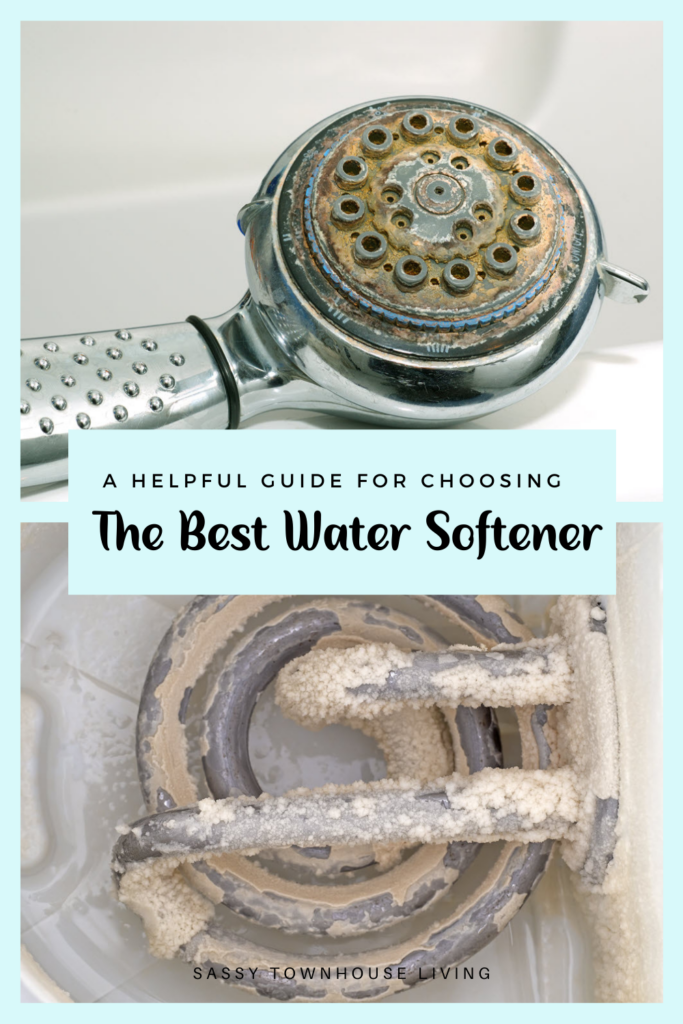A Helpful Guide For Choosing The Best Water Softener
Choosing the best water softener for your home’s water supply is more important than you might think. Using hard water can result in odors that permeate your clothes and unappetizing tastes. Unfortunately, many homes deal with unhealthy water systems wreaking havoc on your health, clothing, and appliances.

Why You Need To Choose The Best Water Softener For Your Home
Nowadays, water softening technology systems have come a long way in their design and ease of installation. Some systems can even run from an app on your phone! If the water in your home tastes terrible, it’s time for a change. More so, if you can feel and see the effects of mineral deposits on your clothes and appliances, choosing the best water softener can be a game-changer.
In this article, you’ll find a guide for choosing the best water softener for your home. Always take the time to research to ensure you select the best system for your budget and your family’s needs.

Most Common Problems Caused By Excessive Minerals
To illustrate, years ago, our first home in PA presented us with hard water loaded with minerals. This problem left our clothes with rust stains and damaged our dishwasher and washing machine. We had no idea the extent of damage minerals caused in our new home.
However, in the long run, we wish we would have done the proper research beforehand. We could have avoided the expense and grief if we took the time to investigate. Fortunately, we installed a great water softening system (here is a DIY water softener installation guide from EcoPure Home), and thankfully this resolved our water problem.
Typically, the most common problems from having excessive minerals in the water include:
- Skin irritation
- Dull hair and soap residue on the skin
- Faster clogging pipes and drains
- Rust stains on sinks, showers, and bathtubs
- Appliance deterioration
- Lathering difficulties
- Bad-tasting water
- Dirty or smelly clothing
- Cloudy or milky water
- Limescale buildup on appliances and bathroom fixtures
- Residue or white spots on dishes
- Rust stains on clothing after washing
Nevertheless, you can see the importance of choosing the best water softener for your home. Sadly, the longer you wait, the worse the problem grows. Usually, the basic rule of thumb to determine the size of water softener for your home is to multiply the number of people in the household by the gallons of water they use daily.
Likewise, the average is 80 gallons per person, according to this guide. You should multiply your total by the number of grains of hardness to calculate how many grains need to be removed.

Understanding What Makes Water Hard
In scientific terms, water hardness is from large deposits of calcium and magnesium compounds in water. In simpler terms, you might notice foul odors or a bad taste. Your hands won’t lather properly, and they feel slimy after washing. Drinking glasses, china, and silverware become spotted. Hight levels of dissolved minerals in your water typically cause this water hardness.
Mostly composed of magnesium and calcium compounds, other metals and minerals can also contribute to the problem. Water hardness can have some health benefits by providing essential minerals, especially calcium and magnesium. Calcium deficiency can occur at any age. And chronic lack can increase the possibility of developing osteoporosis, rickets, and osteopenia.
Above all, deficiency can disrupt the metabolism and contribute to bodily dysfunctions. For example, symptoms include muscle cramps, tooth decay, chest pains, dry skin, brittle nails, and numbness in fingers and toes.
Additionally, hard water can form when it leaches up from the ground through limestone deposits and other minerals. At that point, our water moves through the soil and rock and begins the hard water process. Moreover, hard water does not pose a health risk but creates other serious nuisances.

How To Measure Water Hardness
The EPA uses two categories to interpret test results of hard water – primary and secondary standards. The Primary standards reflect the health considerations and secondary standards on taste, odor, corrosivity, foaming, and staining.
On average, water hardness measures in grains per gallon or liter. Water with compounds of calcium and magnesium of 0.00 to 60 milligrams per liter becomes soft and safe. Water with concentrations of minerals from 61 mg to 120 mg per liter classifies as moderately hard, and water with 121 mg to 180 mg per liter classifies as hard.
Additionally, water with higher concentrations than 180 mg per liter classifies very hard. 180 milligrams convert to 10.515 grains per gallon, and 60 milligrams convert to 3.56 grains per gallon.

Water with Compounds of Magnesium and Calcium
Primarily water systems that use groundwater as a source should be concerned about possible water hardness. Groundwater typically moves through rock and soil, where it picks up its mineral content. Calcium and magnesium are both highly soluble in water.
Similarly, If you live in an area that uses well water or other groundwater sources, naturally occurring minerals are always present. High levels of minerals in your water can damage clothes, appliances, and health, which is why many people choose to install a water softener.
Types of Water Softening Technology
When it’s time for you to purchase a water softening system, it’s important to understand the types available. There are two basic types of systems to consider – salt-based and salt-free.
More so, you can choose an automatic, semi-automatic, or manual system as well. Also, you can try counteracting water hardness by simply adding soda or sodium bicarbonate too.
Below, you’ll discover more about these options.
• Salt-based Softeners
Furthermore, salt-based Softeners are the most popular type of softener. More so, this softener classifies as an ion-exchange softener. The system adds salt to the water to counteract its hardness. The disadvantage is the salty taste. Ion-exchange softeners remove undesirable substances — such as calcium and magnesium ions — and replace them with sodium chloride.
Likewise, the system usually consists of one or two cabinets that house elements of the ion exchanger. The two components include a container with resin beads and with brine. The water runs through the resin beads, which attracts calcium and magnesium ions and releases sodium ions. When the beads saturate, the brine triggers to flush the resin and remove the captured sodium ions.
• Salt-free Softeners
This system uses potassium chloride to counteract the hardness of the water. Many homeowners prefer this system because it results in a salt-free taste. Salt-free softeners called descalers feature salt-free softeners to counteract the buildup of scale. But the minerals remain, and that can be problematic if you have very hard water.
Salt-free softeners don’t remove calcium and magnesium, so they don’t soften the water. They work by conditioning the water. The system runs the water through catalytic media that converts minerals to crystals that don’t adhere to surfaces. Hardness readings of 10 grains per gallon will remain the same after conversion because the hardness is still there but rendered inert.
Salt-free softening is the preferred method for many homeowners because it eliminates the adverse effects of hardness while safeguarding your family from excessive salt consumption. Using a sat-free system eliminates the slimy feel that water hardness can generate.
• Magnetic Softeners
Magnetic softeners employ magnets to treat the water as it passes through the pipes. The magnetic field alters the water’s chemistry. The smaller size and lower prices as this treatment method are beneficial, but the water becomes hard after leaving the magnetic field after about two days.
To illustrate, as the water passes through the magnetic field, it temporarily changes not causing scale deposits. However, the minerals are still there, and standing water can result in scale deposits after two days. Moreover, this includes scale buildup in hot water tanks, even when magnetic fields protect them.

Final Thoughts
In closing, it’s important to check your water softening system to ensure that it can transform your hard water’s grain capacity to an acceptable level. You can find 32.000, 48.000, and 64.000-grain softeners, which means the softener can treat that many grains in one cycle before system regeneration is required.
It’s also important to check the volume of resin in salt-free systems. Most home systems have a resin bed of 1.0 to 2.0 cubic feet. It would be best if you also determined your service flow rate in gallons-per-minute. Most home system flow rates range between 15 and 20 gallons per minute. It’s always important to get assistance from a licensed plumber when choosing and installing a home water softening system.

5 Facts About Nutritional Supplements You Need To Know
Did you know adding nutritional supplements to your diet can be very beneficial even when you maintain a completely healthy diet? Of course, a healthy diet complete with all the nutrients is the best way to maintain good health.
Don’t Forget To Pin Your Inspiration!








